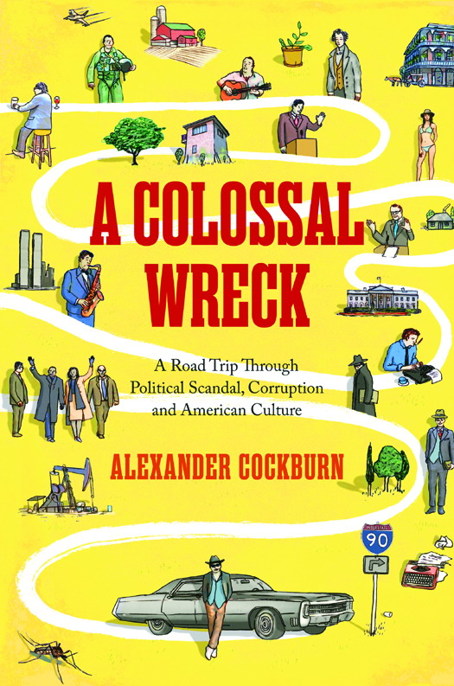
A Colossal Wreck
A Road Trip Through Political Scandal, Corruption and American Culture
کتاب های مرتبط
- اطلاعات
- نقد و بررسی
- دیدگاه کاربران
نقد و بررسی

June 17, 2013
Cockburn, a radical journalist and Nation columnist who died in July 2012, casts a jaundiced, jolly eye on passing scenery in this stimulating if erratic miscellany. In these short, sharp pieces, Cockburn (Corruptions of Empire) covers 18 years of U.S. politics and history, from Monicagate through Occupy Wall Street; recounts travels through America; eulogizes family and friends (and damns nemesis Christopher Hitchens for “constant public drunkenness and brutish rudeness”); and expounds his idiosyncratic version of left-wing politics. Cockburn issues his usual scabrous denunciations—of American military adventures, Wall Street, every Democrat from the Clintons to the “slithery” Obama, and of anyone who was spineless enough to vote for them. Meanwhile he embraces gun culture and conservative populism, which he finds more temperamentally congenial than the politically correct left in the U.S. Cockburn’s stylish prose is full of erudition, ribald gossip, and pithy insight, but under hard scrutiny, it’s not always convincing, reliable, or coherent. He calls Gerald Ford “America’s greatest president” and swats down dubious conspiracy theories only to float his own. (He blames ex-New York Governor Elliot Spitzer’s call-girl scandal on a right-wing plot.) No matter, Cockburn’s gleefully contrarian punditry makes for an entertaining read.

September 1, 2013
The personal and political chronicle of the witty, eloquent liberal scourge who never let left or right get in his way. The late journalist Cockburn (Guillotined: Being a Summary Broadside Against the Corruption of the English Language, 2012, etc.), who died in 2012, was a rare bird in the opinion business: unpredictable yet consistent in his approach to power. Whether writing for the Nation, Village Voice or the newsletter CounterPunch (which he co-founded), he was always the proud son of a family where Marxism was the dominant faith, authority was the enemy, and revolt was the answer. He found Barack Obama "slithery" as a candidate and hopeless as president. He held Rupert Murdoch and the New York Times in equal contempt and regarded Christopher Hitchens as a publicity hound. He was no respecter of party platforms, hating in more or less equal measures the Iraq War, vegetarianism, gun control, abortion, the whole idea of global warming and any police officer who gave him a ticket. He didn't mind taking sides when he had to and happily helped destroy the re-election campaign of South Dakota Republican Sen. Larry Pressler. ("I am responsible for the Democratic majority in the Senate," he later crowed. "Take that, you work-within-the-system types!") He found common ground with anyone who fights the power, including Julian Assange, Ron Paul, and the tea party and Occupy movements. Cockburn loved America but thought it fascist; the killing of Osama bin Laden was an act of "brute, lawless, lethal force." He could get sentimental about the death of old friends but kept mum about his own approaching demise. Instead, he went out in typical style, railing against the military-industrial complex. A fine trip through a rambunctious, productive, provocative and well-lived life.
COPYRIGHT(2013) Kirkus Reviews, ALL RIGHTS RESERVED.

Starred review from September 1, 2013
By the time Anglo-Irish journalist Cockburn (coeditor, CounterPunch magazine) died in 2012, he was widely considered one of America's best radical journalists (a longtime U.S. resident, he became a citizen in 2009). Once described in a New York Times review as a "Marxist Mencken," Cockburn possessed both wicked humor and deadly aim, whether in his muckraking of the CIA or the press or in his political criticism of our presidents, politics, or foreign policy. He could, at the same time, write delightful sketches on horse racing, Thanksgiving, and Louisiana back roads. This book is arranged like a journal, with brief dated entries spanning from 1995 to 2012, and so serving as a continuation of his earlier The Golden Age Is in Us, which left off in 1994. While many entries are borrowings from his published journalism, there's a good deal of personal material here as well, along with contrarian views certain to affront all points along our usual left-right spectrum, whether about gun shows, global warming, Iraq, Israel, police funerals, Ron Paul, Hillary Clinton, or Rupert Murdoch. VERDICT Readers who know Cockburn will need no reviewer's verdict, and those who do not, whether they agree or disagree page by page, will likely relish the book as a demonstration of masterly prose in service of an encompassing spirit.--Robert Nardini, Niagara Falls, NY
Copyright 2013 Library Journal, LLC Used with permission.

September 1, 2013
This collection of essays by avowed leftist Cockburn, who died in July 2012, offers wide-ranging criticism of politics and culture. Cockburn, who grew up in Ireland, renders a broad perspective on political corruption and American culture, including corporate thievery, religious insanity, environmentalism, pornography, and, especially, Washington insiders. He criticized his publisher for glamming up the cover of the 150th anniversary edition of The Communist Manifesto so that it looked more like a memento than a manifesto and also lambasted progressives who live in a bubble-bath of moral self-satisfaction from dawn to dusk. He saw free trade as a class issue, benefiting the better-off while the working class lost jobs. He countered accusations of Saddam Hussein's use of chemical weapons with a reprise of U.S. history of biochemical experiments on black Americans and use in warfare against the Japanese and others. The essays, arranged chronologically, comment on political and cultural developments from 1995 to 2012 and offer scathing criticism along with incendiary letter exchanges with readers of his essays in the Village Voice and the Nation, among other publications.(Reprinted with permission of Booklist, copyright 2013, American Library Association.)

























دیدگاه کاربران